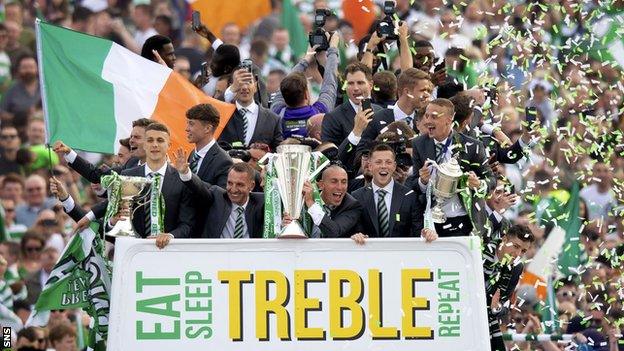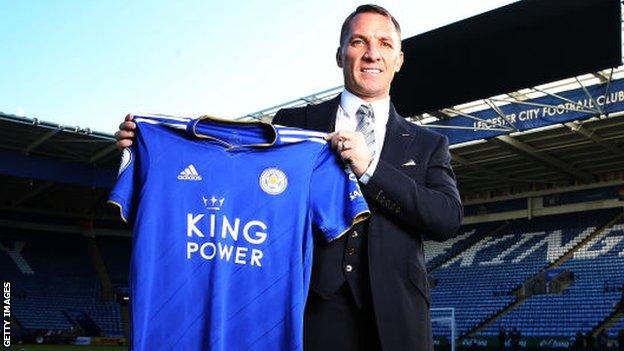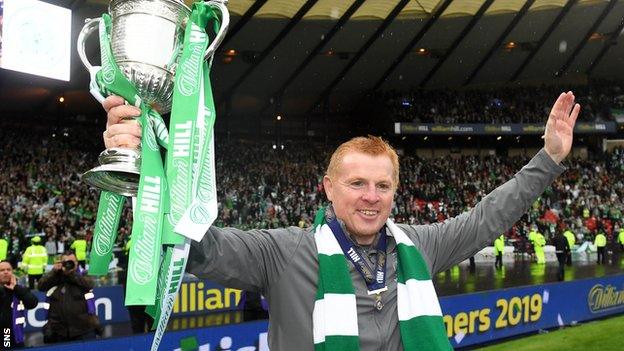Celtic: 'A year to the day since his departure, Brendan Rodgers is not missed by Celtic'
- Published

Brendan Rodgers steered Celtic to seven successive domestic trophies before his abrupt departure
If you ask some fans about the greater betrayal - unfaithfulness by spouse or unfaithfulness by football manager - some might be inclined to turn the question back on the questioner and ask: "What's the difference?"
You might have heard such chat from some Celtic supporters a year ago to the day when, in the words of the banner, Brendan Rodgers "traded immortality for mediocrity" and joined Leicester City.
After two-and-a-half seasons of winning trophies and spinning lines about Celtic not just being "the greatest club in the world" but "a way of life", that he would never give up unless something "extraordinary" happened, Rodgers left Glasgow abruptly.
The love he spoke of regularly had gone overnight it seemed. Before the day was out he was wearing the blue of Leicester and vowing to give his life to making his new supporters proud.
Celtic folk not only felt jilted but angry, and perhaps foolish, for believing Rodgers' constant words of devotion: "I was born into Celtic... Celtic is the ultimate... Being the manager is my dream come true."
If this was the "extraordinary" thing that Rodgers had in mind then not many Celtic fans could see it. They couldn't see it because he'd created an illusion of being one of them.
Some felt that he would be with them all the way to the holy land of 10 league titles in a row because he gave them cause to feel that way. Others weren't so sure and thought he might get lured away after the completion of league number eight and a third successive treble.
What few, if any, envisaged was him exiting mid-season and leaving his "boyhood club" in a lurch. He convinced them their goal was his goal and that he'd never let them down.
Rodgers should be grateful to Lennon
Leicester were 12th in the Premier League when Rodgers joined them. They had just lost 4-1 at home to Crystal Palace and were only eight points outside the relegation zone. That was deemed sufficiently extraordinary for Rodgers to jump.
If the Northern Irishman thought that Celtic fans would appreciate what he had done for them and wish him well in his new adventure, then he didn't understand them the way he always claimed he did. "Never a Celt, always a fraud" they wrote on a banner. Harsh, but heartfelt.
Rodgers believed in his own ability and knew the growth potential of the players he was inheriting. He didn't take on an extraordinary job but he backed himself into turning it into one. Currently, Leicester sit third in the Premier League with Chelsea, Manchester United, Spurs and Arsenal all in their slipstream. Things have worked out for him.
Things have worked out for Celtic, too, of course. Rodgers should give thanks for the success that Neil Lennon has maintained at the club. Had Celtic faltered when Rodgers left and let Rangers in the back door to end the dream of 10 successive titles, then it wouldn't have been the new boss who got the blame so much as Rodgers for abandoning ship and creating uncertainty.
Lennon's sure-footedness in taking Rodgers' team, adding to it and making it better domestically and in Europe, has spared his predecessor a unanimous fury. Celtic fans have the luxury of looking back from a position of great strength, where the gap at the top of the league now is greater than it was when Rodgers left. In every department, Celtic are in better shape than a year ago. For some, that helps the healing.
For some, but not all.
Fans still split over exit

Rodgers has taken Leicester from 12th to third in his year in charge
You can't say that Celtic fans are as one on anything to do with Rodgers. Their emotions are split.
When you canvass opinion you hear so many different things. There are as many views on Rodgers as there were trophies won on his watch. Some will tell you he was part of a glorious period and should be remembered now as a Celtic great because of it. Others will say there will never be forgiveness because of the manner of his "classless" departure, "scurrying away like a rat" as one put it.
Some say that life's too short to harbour a grudge, others say they wouldn't welcome him back at Celtic Park as a guest in one year, 10 years or 20. "The man gave us days that we'll never forget, we should be forever grateful," is one argument. "He treated us with contempt and should be ignored" is another.
The tumult of the day of his exit was surreal and vicious. Shock and anger boiled over into something more sinister among an isolated few. There was the video in the pub of a handful of disgusting Celtic blowhards singing about Rodgers taking a bullet from the IRA. Later, in March, there was the story of the break-in at the former manager's Glasgow home, while his wife and step-daughter were in the house, and the theft of some of his medals from his years at Parkhead by a balaclava-clad robber who took a selfie with the Rodgers' wedding photograph in the background.
In the relative blink of an eye, the manager who had brought seven successive trophies to the club was under attack. Their great redeemer now a great enemy.
In the three seasons before his arrival at Celtic, there was a certain type of democracy in Scottish football. Celtic owned the league but Hibs, Inverness Caledonian Thistle, Ross County, St Johnstone and Aberdeen had all won cups. Rodgers brought an end to that. Celtic started to win everything when he fetched up.
It was Rodgers who rehabilitated James Forrest and Scott Brown and Stuart Armstrong, who he then sold for £7m. It was Rodgers who signed Moussa Dembele, a supreme talent who went for close to £20m, and Odsonne Edouard, another hugely gifted player who may go for more when the time comes. It was Rodgers who brought Celtic back to the Champions League two seasons running and brought Rangers to their wits' end with one pummelling after another.
He wasn't perfect. His European record was poor, some of his other signings were scattergun, some of the football towards the end was a bit laboured. Overall? Rodgers was a roaring, historic success. Manager of the Invincibles, winner of two trebles and architect-in-chief of a third. He left silverware in the trophy room, money on the balance sheet and memories in the bank.
Celtic revitalised on pitch & in stands
And then he answered Leicester's call and everything changed. A flutter of the eyelashes from the Premier League and he was gone. There was no fond farewell to his players, no face-to-face goodbye to his staff, no waving to crowd at season's end. There was just the sound of his car heading out of Lennoxtown, never to return.
The narrative at the time was that had Rodgers waited until the end of the season there would have been understanding and gratitude among the support. Maybe.
Of course, had he waited until the summer there would have been no guarantee of Lennon's availability. Lennon officially parted company with Hibs on 30 January last year. Would he have still been on the market come May or June? That's hard to say. The rich irony, though, is that on the one hand Rodgers' timing was appalling and deserving of heavy criticism and on the other, in hindsight, it was perfect. Lennon was free and fired up for the challenge.
He has brought new players, a new style and a new energy, not just on the pitch but in the stands. The club didn't want Rodgers to leave but it could be argued that him leaving was no bad thing. Maybe Rodgers was beginning to tire of his surroundings. Maybe him looking for the next big thing would have diminished Celtic. Maybe a new edge was required to drive them on to their dream of 10 in a row.
They have it, no question. Lennon has been outstanding in Rodgers' wake. A year on and the Leicester manager is not missed at Celtic and nobody would have thought that possible at the time of his abdication. No one person is bigger than a club. In Celtic's response to Rodgers' departure, we see the absolute truth of that.

Neil Lennon completed Celtic's treble treble last season and is on track for another clean sweep this term
